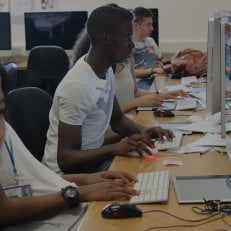Mental Health Awareness Week: making the fundraising case for tackling loneliness
This year’s Mental Health Awareness Week (9-15 May 2022), focuses on loneliness.
According to the Mental Health Foundation, loneliness affects one in four adults – who feel lonely some or all of the time. Some people are also at higher risk of feeling lonely than others and the longer we feel lonely, the more we are at risk of mental health problems. Traditionally, we have seen loneliness as a problem for older people. Increasingly we are coming to realise that young people, including teenagers and children, can be affected by loneliness too.
Plenty of charities – including Craigmyle clients such as Our Time (image below of drama workshops for young people), Fight Against Blindness and Change of Scene – are providing vital support to those who are lonely and at risk of isolation and mental health problems.

The recent experience with lockdown has resulted in greater public understanding of loneliness. This of course presents an opportunity to harness empathy and good will into donations, that help fund programmes that have been developed to meet increased needs.
New initiatives include social prescribing to link those in need with therapeutic activities, such as gardening or creative arts. Or projects, such as The Man Sheds, that target particular groups, creating spaces for them to come together.
So, what can charities do to help make the fundraising case for tackling loneliness?
- Tell stories – show the personal impact of loneliness and relate it to the public’s recent experiences in lockdown.
- Demonstrate impact – do you have the systems in place to track the difference your charity makes to people’s lives? Measuring improvements in wellbeing isn’t easy but it can be done.
- Think big and highlight the wider consequences – loneliness doesn’t just impact the individual, but has social costs. Similarly, charity action to tackle loneliness can bring communities together as well as the wider economic, social and cultural benefits.
- Connect with and inspire your donors – many will have experienced loneliness during their lifetime. Take time to build relationships with them, listen to them and explain how they can help others.
- Consider young people – if you work with young people or children, have you looked at issues of loneliness in your user group? Have you considered what services you could establish to support users who feel lonely? You might be able to raise project funding for this issue as it is emerging and funders may be keen to finance projects that are an innovation in the area.
Craigmyle Fundraising Consultants enables UK charitable causes to achieve their goals. If you would like to hear more about the tailored expertise we can provide to help your organisation, do get in touch.





